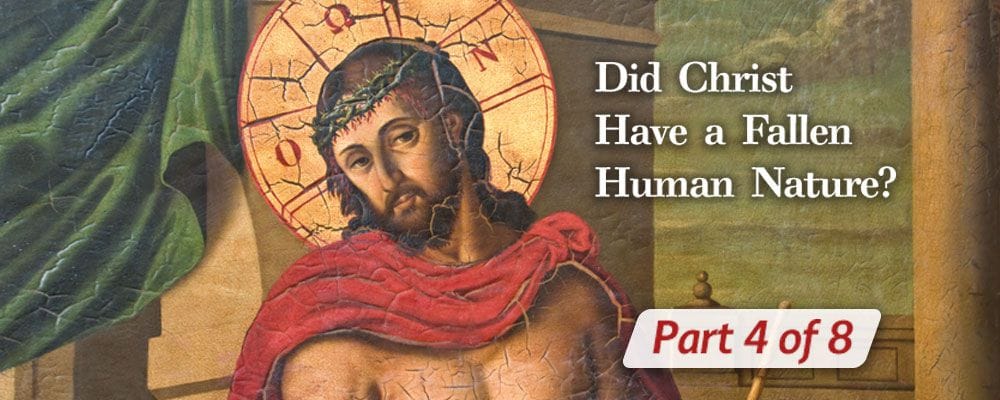
Did Christ Have a Fallen Human Nature? — Part 4 of 8
Did Christ exercise control over the passions?
The following quotations from Church councils, Church fathers, services and contemporary authors bring the Church's answer to this question into focus.
1) Official pronouncement of the Church
Sixth Ecumenical Synod, Synodical Letter by St. Sophronios of Jerusalem
He gave to the human nature, whenever He wanted, time to act and to suffer what was proper... For He did not accept these [human idioms] involuntarily or by constraint... His human characteristics were above human nature. Not because [His] nature was not human, but because He became a human being voluntarily, and having become a human being He accepted [them] voluntarily; and they are not [acting] tyrannically or by constraint and unwillingly, as it is with us, but He gave His consent whenever and to the extent that He wanted He allowed them to inflict pain on Him and to cause Him sufferings which were against nature.
2) The witness of the Holy Scripture
John 10:18
No one takes [My life] from Me, but I lay it down on My own accord. I have power to lay it down, and I have power to take it again.
3) The witness of the Fathers of the Church
St. Hilary
He had a body to suffer and He suffered, but He had not a nature which could feel pain, for his body possessed a unique nature of its own; it was transformed into heavenly glory on the Mount, it put fevers to flight by its touch, it gave new eyesight by its spittle.
St. Ambrose
He did not hunger because He was overcome by the weakness of the body, but by His hunger He proved that He had verily taken upon Himself a body; that so He might teach us that He had taken not only our body, but also the weaknesses of that body.
St. Maximos
When it comes to the Lord the natural characteristics do not precede His will, as it happens with us. For even though He truly hungered and thirsted, He did not hunger and thirst after our manner, but in a manner that exceeds ours, because He accepted such things voluntarily.
4) The witness of the hymnology of the Church
Vespers of the Holy Spirit
Master, who by extreme condescension have become a partaker with us of like flesh and blood and of our blameless passions, which You have willingly accepted to experience in Your bowels of compassion; and in that You Yourself have accepted to be tempted, You of Your own free will became a Helper for us that are tempted; wherefore, You led us into Your own passionlessness.
5) The confirmation by Orthodox theologians
Vladimir Lossky
Only Christ has known what death really is, since His deified humanity must not die. Only He could take the full measure of agony, since death seized His being from the outside instead of welling up like fate from within, instead of being, as with fallen man, the irreducible kernel of a being mixed with non-being when sickness and time have corrupted his pulp of flesh… The finality of death was, in effect, not rooted in the human nature of Christ.
Fr. John Romanides
That He was not allowing oeconomically His incorruptibility to be operative does not mean that He was under the dominion of death. He received the human nature from the Virgin through the Holy Spirit as it was before the fall, neither incorruptible nor under the dominion of death.
Metropolitan Hierotheos
The innocent passions functioned in Christ above nature, because it was not possible for them to take precedence over His will. There was nothing compulsory in Christ. Therefore it was by willing that He hungered, by willing that He thirsted, by willing that He was afraid, and by willing that He died. In other words, the passions did not govern Christ, but Christ governed them.